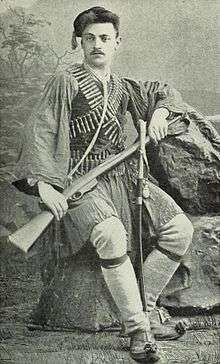Boris Sarafov
| Boris Petrov Sarafov Борис Петров Сарафов | |
|---|---|
 Portrait of Boris Sarafov | |
| Born |
12 July 1872 Libyahovo, Ottoman Empire (now Bulgaria) |
| Died |
28 November 1907 (aged 35) Sofia, Principality of Bulgaria |
| Religion | Eastern Orthodox Christian |
Boris Petrov Sarafov (Bulgarian and Macedonian: Борис Петров Сарафов) (12 July 1872 in Libyahovo, Salonica Vilayet, Ottoman Empire, present-day Hadzhidimovo Municipality, Bulgaria – 28 November 1907 in Sofia) was a Bulgarian officer and revolutionary, one of the leaders of Supreme Macedonian-Adrianople Committee (SMAC) and Internal Macedonian Revolutionary Organization (VMORO).[1][2][3] He is considered an ethnic Macedonian in the Republic of Macedonia.[4][5]
Biography
Boris Sarafov was born in 1872, in village Libyahovo (today Ilinden), Nevrokop region, in the Salonica Vilayet of the Ottoman Empire. He grew up schooled through the Bulgarian Exarchate's school in Nevrokop and the Bulgarian Men's High School of Thessaloniki. Later Sarafov attended the Military School of His Majesty in Sofia, capital of the recently created Principality of Bulgaria. His training in this institution ended in 1894. Afterwards he worked for a short period of time as Bulgarian Army officer. In 1895 Sarafov became a member of the Macedonian Supreme Committee and was releaseаd from the Army. Than he just have led an insurgent operation in Ottoman Macedonia and occupied Melnik for a few days. Later he worked again as officer for a short time. Six years after the establishment of the Macedonian Supreme Committee based in Sofia, in 1899 he became its leader. As a rule, most of its leaders were with stronger connections with the governments, waging struggle for a direct unification with Bulgaria. During his time under the patronage of Prince Ferdinand, Sarafov was conjuring revolutionary ideas that later proved to be at odds with the policy of the government. Sarafov had apparently overstepped his prerogatives by plotting the assassination of a Romanian newspaper editor who had published unflattering remarks about the Committee. The journalist's murder brought Bulgaria and Romania to the brink of war. In 1901 Sarafov was stripped of his chairmanship and jailed for a month.
Sarafov was also a man of considerable charm. He had travelled widely in Europe raising funds for a war against the Turks. This included seducing the plain daughters or bored wives of wealthy men and persuading them to make donations to the revolutionary cause. In 1902 Sarafov was elected among the leaders of the Internal Macedonian-Adrianople Revolutionary Organization (IMARO). He participated in the Ilinden-Preobrazhenie Uprising and after all seemed lost, along with Dame Gruev attempted to exploit the Supremists’ former favourable position with the Bulgarian government, by sending it a desperate letter pleading for military assistance, but failed. The failure of the Ilinden Uprising also reignited the old rivalries between the varying factions of the Macedonian revolutionary movement. Sarafov resorted back to his old ways, turning against left-wing leading figures such as Yane Sandanski and Hristo Chernopeev, earning him much suspicion. The left-wing faction opposed Bulgarian nationalism and advocated the creation of a Balkan Federation with equality for all subjects and nationalities. The Centralist's faction of the IMARO, drifted more and more towards Bulgarian nationalism since 1904. The years 1905-1907 saw the slow split between the two factions. Finally, as a result Sarafov was sentenced to death from the leftists. He was assassinated in 1907 in Sofia together with Ivan Garvanov by Todor Panitsa, a trusted man of Yane Sandanski.[6]
Gallery
 Boris Sarafov and his supporters.
Boris Sarafov and his supporters. Lieutenant Boris Sarafov's revolutionary band
Lieutenant Boris Sarafov's revolutionary band The bodies of Ivan Garvanov and Boris Sarafov among their friends.
The bodies of Ivan Garvanov and Boris Sarafov among their friends.
References
- ↑ The Past in Question: Modern Macedonia and the Uncertainties of Nation, Keith Brown, Princeton University Press, 2003, ISBN 0691099952, p. 175
- ↑ In the autumn of 1903 Boris Sarafov in conjunction with Dame Gruev, both members of the general staff of the Bitola revolutionary district during suppression of the Ilinden-Preobrazhenie uprising, wrote a letter to the Bulgarian government with demand for direct Bulgarian military intervention, arguing for this with the words: "With a view to the critical and fearsome situation, in which the Bulgarian population of Manastir Vilayet is at that moment" and "the circumstances and the danger, which threaten Bulgarian fatherland today".
- ↑ Who Are the Macedonians? Hugh Poulton, C. Hurst & Co. Publishers, 2000, ISBN 1850655340, p. 55.
- ↑ M. Malecki, Z zagadnien dialaktologii macedonskiej, Rocznik Slawistyczny (Krakow), XIV (1938), p.142
- ↑ МАКЕДОНСКIЙ ГОЛОСЪ Органъ сторонниковъ независимой Македонiи, 9-06-1913 , Русија
- ↑ Articles from newspapers
| Wikimedia Commons has media related to Boris Sarafov. |
